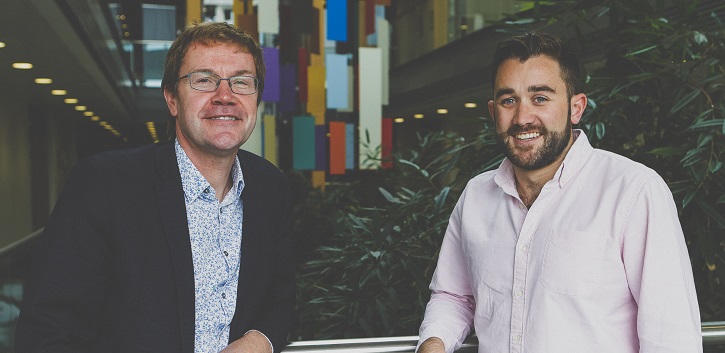UCC research breakthrough could improve breathing in neuromuscular disease

Research from the Department of Physiology, UCC, has revealed a compensatory phenomenon supporting breathing in a pre-clinical model of Duchenne muscular dystrophy (DMD), a fatal genetic disease affecting approximately 1 in every 3500 men.
This new discovery in the research, published this week in The Journal of Physiology, offers potential for the development of interventional strategies in DMD patients.
DMD is characterised by the absence of dystrophin, a pivotal protein essential for healthy muscle structure and function, with patients exhibiting profound respiratory muscle weakness culminating in respiratory failure and shortened life span.
Lead investigators David Burns and Ken O’Halloran from UCC explored mechanisms of nervous system control of breathing in an established dystrophin-deficient mouse model of the disease.
The UCC team discovered enhanced activity in the motor nerve supplying the diaphragm muscle, the major muscle of breathing. This intrinsic physiological mechanism of neural compensation for muscle weakness offers a therapeutic target for the preservation of respiratory capacity in DMD, and potentially other neuromuscular diseases.
“Our study is the first step on a journey towards translating novel findings in pre-clinical models to effective therapies for patients” said Ken O’Halloran, Professor of Physiology and senior author on the study.
“A better understanding of the physiological adaptations and pathophysiological mechanisms of disease progression, offers opportunity to develop safe interventional strategies to boost intrinsic compensatory mechanisms to preserve breathing capacity in DMD.”
The comprehensive study was a multi-institutional collaboration between UCC as the lead institution, and teams at the University of Calgary and Trinity College Dublin, headed by Dr Richard Wilson and Dr Deirdre Edge, respectively.
First author on the research study, David Burns, PhD trainee, said: “Building on our study, future work exploring distinct mechanisms of neuroplasticity should provide new approaches in the treatment of respiratory deficits in DMD and other neuromuscular diseases. We are currently exploring the full range of consequences associated with dystrophin deficiency and ways to harness neural compensation to improve respiratory performance.”
In recognition of the significance of the work, Burns was presented with the prestigious Usha Award from the American Physiological Society earlier this year.
The findings of the study were presented at invited seminars at the University of Florida and at the Mayo Clinic in the US, and showcased earlier this month at a symposium titled ‘Breathing with neuromuscular disease: consequences and compensation’ at a major international conference at Oxford University.
For more on this story contact:
Lynne Nolan, Media & PR Officer, UCC: 087 210 1119.
